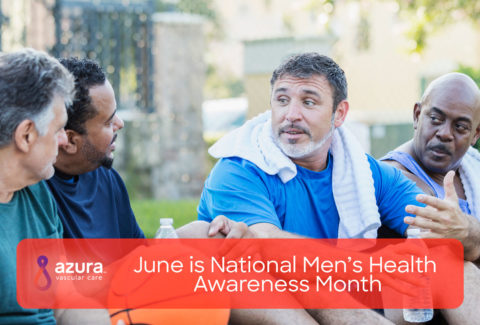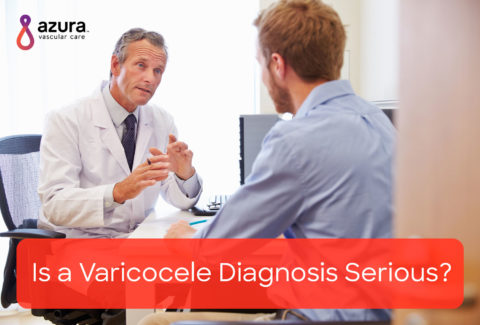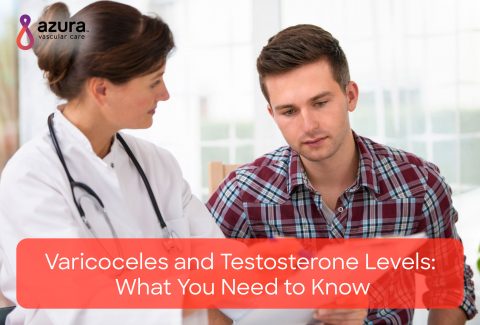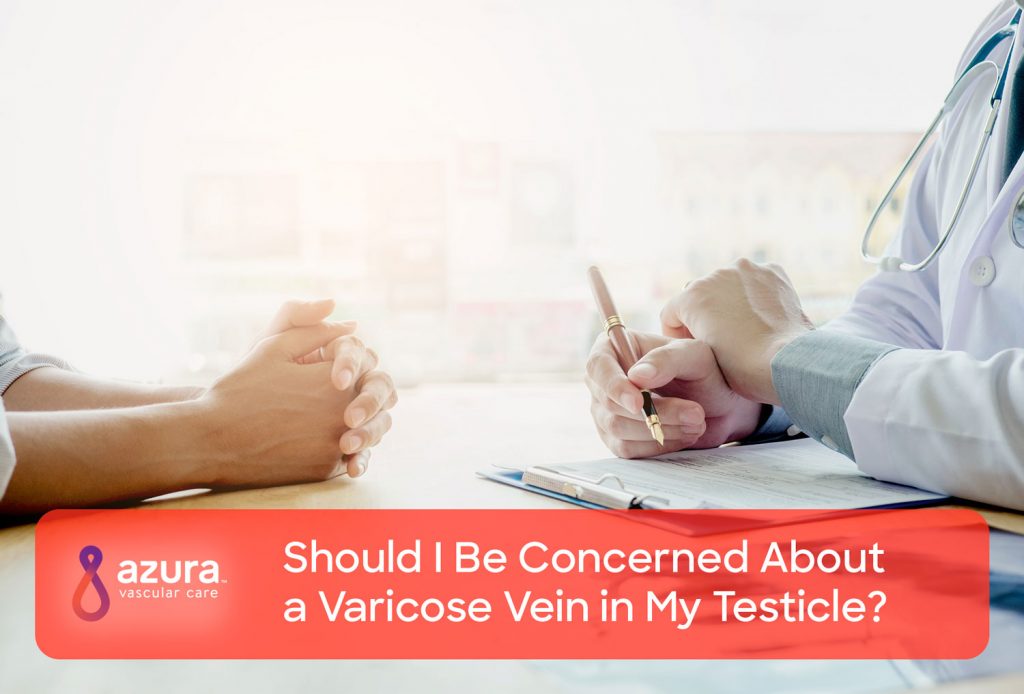
If you notice a varicose vein in your testicle, you may be wondering, “Is this condition dangerous?” A varicose vein in the testicle, known as a varicocele, is not always harmful to your health but can sometimes cause testicular pain or other unwelcome symptoms. (i) A varicocele may even affect your fertility or testosterone production. (ii) Read on to learn more about potential health risks associated with this condition.
What Is a Varicose Vein?
To begin, it’s important to understand what a varicose vein is and how it develops. Your arteries pump oxygen-rich blood from the heart to the tissues of the body and veins carry blood low in oxygen from the tissues of the body back to the heart. The veins in your body are less muscular than arteries and are equipped with valves that keep blood flowing in the right direction, toward your heart. (iii)
But sometimes, these valves don’t work properly. When the valves in your veins malfunction, blood can pool in a segment of the vein. The veins can then become swollen, twisted, or enlarged. When this occurs, these veins are known as varicose veins.
Varicose veins can appear on any part of your body and are especially common in the lower legs and feet. (iv) While many people think of varicose veins as only a cosmetic nuisance in the legs, testicular varicose veins, can sometimes develop.
What Is a Varicocele?
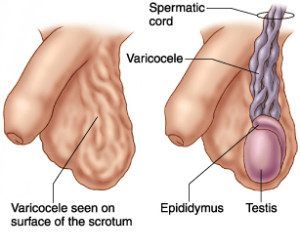
A varicocele is a varicose vein in the testicle. Up to 15 percent of men may have a varicocele, but many are unaware of it. (i) Varicoceles can be asymptomatic, so you may not realize you have a varicocele unless a doctor examines during a routine checkup and notices it.
What Are the Symptoms of a Varicocele?
If your varicocele produces symptoms, you may experience any of the following: (v)
- Testicular pain
- Heavy or aching testicles
- Low sperm count
- Enlarged or twisted veins on the scrotum
- A lump on the testicles
If your varicocele is triggering health problems, treatment might be necessary.
Is a Varicose Vein in the Testicle Affecting Your Health?
Varicoceles are not life-threatening, but they can affect your health and cause pain and swelling in the testicles, which might be uncomfortable. (vi) Many men with varicoceles find that their pain is worse after exercise or after standing for a long period of time. (v)
A varicocele may also contribute to:
- Low testosterone: Some studies have shown a link between varicoceles and low testosterone. (vii) Low testosterone can make it hard to look and feel your best, negatively affecting your health, sex life and general wellbeing. Low testosterone can cause a variety of symptoms such as weight gain, reduced sex drive, fatigue, erectile dysfunction, depression, trouble sleeping and difficulty concentrating. (viii)
- Infertility: One of the most common causes of infertility in men is varicoceles. (ii) If you and your partner are trying to conceive, you may need to seek treatment for your varicocele. While varicoceles don’t always cause fertility problems, they may contribute to difficulty in getting pregnant.Many couples think of infertility solely as a female issue. But in about 40 to 50 percent of cases, infertility may be due to factors affecting the male body. (ii) Often, male infertility is due to low sperm count or poor sperm motility. Your varicocele can affect testicular temperature, blood flow, and intratesticular pressure. These factors can all affect the quality of your sperm.
If your varicocele is uncomfortable or keeping you from enjoying an active lifestyle, if you’re struggling with symptoms of low testosterone, and if you’re experiencing fertility issues, varicocele treatment may help.
Is There a Minimally Invasive Treatment Available?
One varicocele treatment option is varicocele embolization. Varicocele embolization is a nonsurgical option for treating a varicose vein in the testicle. This procedure boasts a 90 percent success rate and is far less invasive than many surgical approaches. (ix)
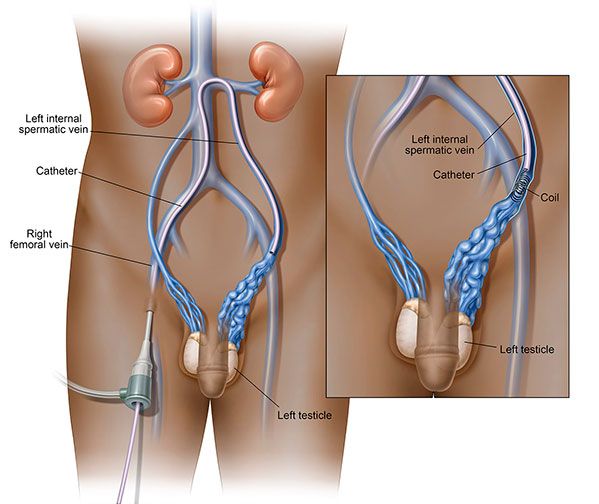
How Does Varicocele Embolization Work?
During a varicocele embolization procedure, a vascular specialist makes a tiny incision in the femoral vein in your groin. The specialist threads a thin catheter through this incision in the femoral vein to the varicocele. Finally, through the catheter the specialist places a small coil or special fluid inside the affected vein. This coil or fluid blocks off the vein and redirects blood flow. Over time, the vein shrinks and the varicocele disappears. (x)
What Are the Advantages of Varicocele Embolization?
Varicocele embolization is minimally invasive and usually performed as an outpatient procedure. You do not need to be hospitalized or placed under general anesthesia. Your doctor uses a local anesthetic to numb the affected area, and you can return home soon after your procedure. (x)
Varicocele embolization also involves a much shorter recovery time than surgical treatments. Most patients can return to their normal activities within a day or two. And because there is only a small incision, there is minimal risk of scarring and a reduced risk of infection.
Although a varicose vein in the testicle may have a negative impact on your health, the right treatment can help resolve your symptoms. If you’d like to learn more about varicocele treatment options like varicocele embolization, download our free information sheet below or call 844-705-VEIN (8346) to schedule an appointment with a vascular specialist.
Sources:
(i) Stanford Health Care. Symptoms of varicocele. Retrieved August 1, 2018, from https://stanfordhealthcare.org/medical-conditions/mens-health/varicocele/symptoms.html
(ii) Kantartzi, P. D., Goulis, C. D., Goulis, G. D., & Papadimas, I. (2007). Male infertility and varicocele: Myths and reality. Retrieved August 1, 2018, from https://www.ncbi.nlm.nih.gov/pmc/articles/PMC2658802
(iii) John Hopkins Medicine. Overview of the vascular system. Retrieved July 31, 2018, from https://www.hopkinsmedicine.org/healthlibrary/conditions/cardiovascular_diseases/overview_of_the_vascular_system_85,P08254
(iv) MedlinePlus. (2016). Varicose veins. Retrieved July 31, 2018, from https://medlineplus.gov/ency/article/001109.htm
(v) Mayo Clinic. (2017, December 27). Varicocele. Retrieved July 26, 2018, from https://www.mayoclinic.org/diseases-conditions/varicocele/symptoms-causes/syc-20378771
(vi) WebMd. (2017, December 1). What is a varicocele? Retrieved July 31, 2018, from https://www.webmd.com/men/what-is-varicocele#1
(vii) C. Tanrikut, M. Goldstein, J. S. Rosoff, R. K. Lee, C. J. Nelson, & J. P. Mulhall. (2011). Varicocele as a risk factor for androgen deficiency and effect of repair. Retrieved July 31, 2018, from https://www.ncbi.nlm.nih.gov/pubmed/21435152
(viii) WebMD. (2017, January 14). Low testosterone and your health. Retrieved August 1, 2018, from https://www.webmd.com/men/what-low-testosterone-can-mean-your-health
(ix) Halpern, J., Mittal, S., Pereira, K., Bhatia, S., & Ramasamy, R. (2015, December 8). Percutaneous embolization of varicocele: Technique, indications, relative contraindications, and complications. Retrieved August 1, 2018, from https://www.ncbi.nlm.nih.gov/pmc/articles/PMC4770492/
(x) John Hopkins Medicine. Varicocele embolization. Retrieved August 1, 2018, from https://www.hopkinsmedicine.org/healthlibrary/test_procedures/urology/varicocele_embolization_135,383

